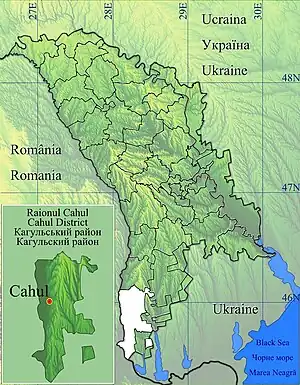Huluboaia | |
|---|---|
Village | |
 | |
 Huluboaia | |
| Coordinates: 46°3′30″N 28°20′7″E / 46.05833°N 28.33528°E | |
| Country | |
| Government | |
| • Mayor | Valeriu Oboroc (PSRM[1]) |
| Population | |
| • Total | 794 |
| Time zone | UTC+2 (EET) |
| • Summer (DST) | UTC+3 (EEST) |
| Postal code | MD-3920[4] |

Huluboaia is a village in Cahul District, Moldova,[5] By the 2014 census the village has a population of 794 people.
Until 1912 it was called Novohrad, in 1912 it was renamed Goluboje (Russian: Голубое). It was founded by Czechs, and has a Czech minority, which calls it Holuboje. By the fall of the Soviet Union, most Czechs returned to the Czech Republic.
Geography
Huluboaia lies about 25 km (16 mi) northeast of Cahul, approximately 15 km (9 mi) from the Romanian border. It is located on the elevation 164 meters above sea level on the river Salcia Mare.
Demographics
By the last census (2014) 794 people lived here.
According to the 2004 census, 1011 people lived here (494 male, 517 female).
Ethnic makeup (2004):
| Ethnicity | Population | % |
|---|---|---|
| Moldovans | 468 | 46,29 |
| Ukrainians | 262 | 25,91 |
| Russians | 79 | 7,81 |
| Bulgarians | 56 | 5,54 |
| Gagauzs | 16 | 1,58 |
| Romanians | 2 | 0,2 |
| Other | 128 | 12,66 |
| Total | 1011 | 100% |
History
Huluboaia was founded in the 1880s by Czechs from Ukrainian Novhorodkivka (also a Czech settlement). Because in Ukraine, there was a small amount of soil for harvesting crops, 153 migrants moved to the then Bessarabia, where they established the village Novohrad. In the year 1912 the village renamed to Holuboje (meaning „dove“ or „blue“). From the year 1934 a school functioned, where Czech was being learned.
Huluboaia today is the center of Czech countryman in Moldova.[6] Surnames like Karásek, Pluhař or Lněnička are common here, even if the young generation speaks Czech more advisedly and use Russian.
Present
From the year 2004 a Czech countryman association Novograd, is registered here, under the presidency of Ivan Lauda. The association has more than 120 members.
Most of the people, live from own agricultural activities, mostly harvesting corn and grapevine. In school functions a Czech language course (Kroužek českého jazyka Novohrádek); in the summer students from the Czech Republic arrive here, to teach Czech.[6] The current mayor is Valeriu Oboroc.
Local russified Czechs, have worries from the alleged Moldovan nationalism, watch mainly Russian television and have a Russian stance on the Russo-Ukrainian War and the role of the US in it. Local schoolchildren are either from mixed Czech-Moldovan or Czech-Bulgarian wedlock and the Russian environment caused, that they view Russian as native.[7]
References
- ↑ "Lista primarilor aleși în cadrul Alegerilor Locale Generale din 14 iunie 2015" (in Romanian). Central Election Commission of Moldova. 2015. Retrieved 2016-04-15.
- ↑ Results of Population and Housing Census in the Republic of Moldova in 2014: "Characteristics - Population (population by communes, religion, citizenship)" (XLS). National Bureau of Statistics of the Republic of Moldova. 2017. Retrieved 2017-05-01.
- ↑ "Populația pe medii, localități și sexe, în profil teritorial" (XLS). Biroul Național de Statistică al Republicii Moldova. 2004. Retrieved 2012-10-15.
- ↑ "Oficiul Poștal Huluboaia, raionul Cahul". Poșta Moldovei. Archived from the original on 2015-06-27. Retrieved 2015-06-26.
- ↑ Clasificatorul unităților administrativ-teritoriale al Republicii Moldova (CUATM) (in Romanian)
- 1 2 "Lukáš Policar » Na návštěvě u moldavských Čechů | Názory Aktuálně.cz". 7 December 2008.
- ↑ "Konec českého 'breptání' v Moldavsku: reportáž z obce, kde Češi vymírají" (in Czech). Lidovky.cz. 2014-09-21. Retrieved 2022-07-21.
External links
- Milena Štráfeldová: Olga Granici je první Češka z moldavského Holuboje, která se vypravila studovat do Prahy, Radio Prague, 6. 3. 2010
- Holuboje, česká vesnice v Moldavsku – short informational video on YouTube